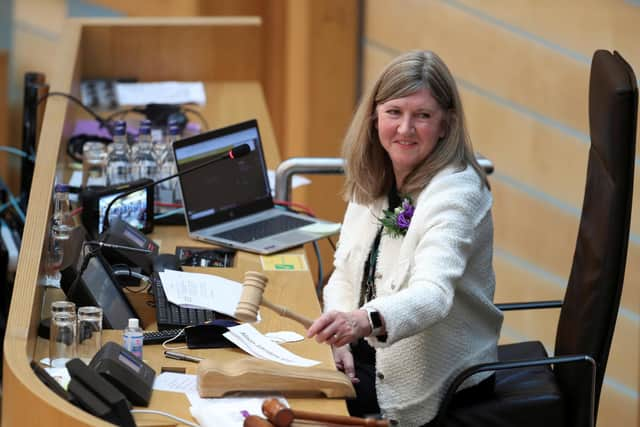Why Scottish Parliament took nearly six hours to elect two deputy presiding officers and how it can avoid doing the same again – Ian Swanson
and live on Freeview channel 276
Let us know what you think and join the conversation at the bottom of this article.
Thanks to an extremely cumbersome balloting procedure, they had to wait until late afternoon for the next item on the agenda – answers to "urgent" questions on the Glasgow immigration raid, the SQA’s pupil assessments and Covid restrictions in Moray.
Lothian Green MSP Alison Johnstone had already been installed as the new presiding officer the day before. In the new finely-balanced parliament, none of the bigger parties wanted to give up an MSP for the job, which involves suspending political affiliation, so Ms Johnstone was the only candidate. She is the first Green to take the post and her widely-acknowledged experience, integrity and fairness make her well fitted for the role.
Advertisement
Hide AdAdvertisement
Hide AdDeputy presiding officers, however, are not expected to renounce their party ties, so there were 10 candidates for the two posts.
For most business, Hoyrood uses an electronic voting system, but the election of the presiding officer and deputies is conducted by secret ballot, which inevitably takes longer – and Covid added to the problems because all 129 MSPs could not fit in the chamber with the required physical distancing, so the public gallery and the entrance hall were being used as well.
The procedure for these elections involves rounds of voting, with the candidate with the lowest vote being excluded each time until someone has a majority. Each round requires fresh ballot papers to be prepared, printed, distributed, collected and counted.


And when one deputy presiding officer is finally elected, the whole process has to begin all over again with all the original the candidates re-entering the contest.
Advertisement
Hide AdAdvertisement
Hide AdA few candidates who were failing to attract much support helpfully withdrew at various stages to speed the process, but it still took far too long.
At one point an exasperated Daniel Johnson, Labour MSP for Edinburgh Southern, raised a point of order to propose the system should be changed to the single transferable vote (STV).
They couldn’t change it part-way through the process, but the presiding officer said she agreed the issue should be looked at before the next such election.
STV, where voters rank candidates in order of preference, would indeed be a more sensible system. In fact, this is exactly the kind of situation STV is ideally suited for. It is currently used in Scotland’s council elections and all the talk of “super-majorities” in this year’s election campaign – raising the possibility of pro-independence parties having a majority of seats without a majority of votes – prompted calls for it to be extended to Holyrood too.
Advertisement
Hide AdAdvertisement
Hide AdThe theory is the proportion of seats a party wins should match the proportion of the vote received. But STV has fatal flaws in a party-based system: it all depends on how many candidates a party decides to put up – field too many and it splits the vote, cutting the number of seats; field too few and it fails to get as many as it should.
When it comes to choosing individuals for posts like deputy presiding officer that’s not a problem. MSPs who value their time would be wise to vote for STV for next time.
A message from the Editor:
Thank you for reading this article. We're more reliant on your support than ever as the shift in consumer habits brought about by coronavirus impacts our advertisers.
If you haven't already, please consider supporting our trusted, fact-checked journalism by taking out a digital subscription.
Comment Guidelines
National World encourages reader discussion on our stories. User feedback, insights and back-and-forth exchanges add a rich layer of context to reporting. Please review our Community Guidelines before commenting.
